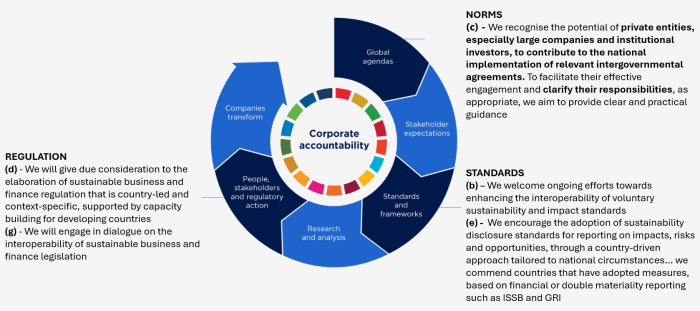What UN’s Fourth International Conference on Financing for Development means for corporate accountability and multilateralism
The Fourth International Conference on Financing for Development (FfD4) addresses the urgent need to fully implement the Sustainable Development Goals and support the reform of the international financial architecture.
It comes at a pivotal moment for multilateralism and sustainable development. As the world faces escalating crises, from climate breakdown to mounting inequality and rising debt, we need increased ambition and effective implementation. This includes efforts from companies and financial institutions, who control the majority of global economic activity and have a huge footprint in terms of workers, emissions, land use, technology, and investments.
How can FfD4 advance global norms on business?
Since its launch in Monterrey in 2002, the Financing for Development agenda has acknowledged the importance of the private business and finance. However, it is clear that progress is not happening at the pace and scale needed. Analysis by the World Benchmarking Alliance shows that only 3% of the world’s most influential financial institutions have credible climate transition plans in place and just 6% express financing support to low-income countries[1].
What sets FfD4 apart from other UN processes is its explicit recognition of the private sector in the intergovernmental agenda. Chapter Two of outcome document offers one of the most comprehensive articulations on how the private sector can align and contribute to the implementation of UN frameworks and goals. As FfD4 is not limited to one domain (e.g., climate, biodiversity, health), it provides a cross-cutting platform to support private sector engagement and accountability towards sustainable development.
Importantly, Paragraph 34 goes beyond private financial flows and emphasises how business and finance can actively contribute to development outcomes. It includes language – some explicit, some emerging – around the need to establish norms, and encourage the harmonisation of standards and regulations. These tools are essential for embedding economic, social, and environmental concerns into global value chains. As such, FfD4 holds the potential to catalyse a new governance framework that enhances the private sector’s positive impact to sustainable development.
Diagram: Mapping of commitments of the FfD4 outcome document against WBA’s corporate accountability process[2]:

How can FfD4 create institutional coherence for private sector engagement and accountability?
Todays fragmented geopolitical landscape is fueling divergent expectations of business, making it harder for leading companies to act decisively and operate with clarity and consistency. At the same time, the multilateral system is facing growing resource constraints underscoring the need for it to become more agile, coherent and accountable.
Against this backdrop, it is in the interest of UN Member States to create a more coherent and predictable environment for the private sector that supports long-term stability and sustainable economic development.
Building on the 2024 Pact for the Future, which set out a blueprint for effective and inclusive multilateralism, there is a timely opportunity to reassess how the private sector is structured within global governance. This includes Action 55C of the Pact, which calls on Member States to both encourage private sector contributions and strengthen their accountability across the UN system.
The precedent already exists: initiatives such as the UN Global Compact have engagement and mobilised business, while the UN Guiding Principles on Business and Human Rights have helped to define responsibility.
A system-wide and accountable approach to the private sector in global governance must be in place to deliver on a post-2030 agenda that reflects the realities of a shifting world order.
Recommendations: Driving corporate accountability at FfD4
To unlock the full potential of the private sector in delivering sustainable development, FfD4 must be leveraged to lay the institutional and normative foundations on private sector engagement and accountability:
-
Define Private Sector Responsibilities in Global Frameworks
Establish clear expectations for business and finance in delivering the SDGs, Paris Agreement, and Global Biodiversity Framework. Build on existing normative instruments such as the UNGPs and embed responsibilities across domains including climate transition, digital governance, and biodiversity. -
Empower a Reformed UN Development System
Enable the UN Development System to coordinate private sector engagement and accountability across agencies, reduce fragmentation, and ensure consistent accountability. Structural reform must include a whole-of-society approach where business is a contributor and accountable partner in upholding global agreements.
WBA stands ready to support the advancement of this agenda. By providing data and insights on company performance in relation to global agendas, and collaborating with the 400+ multistakeholder organisations in our Alliance, we are committed to work with UN Member States on taking this forward.
If you’d like to learn more get in touch with Charlotte Reeves, Global Engagement Lead: [email protected].
[1] https://www.worldbenchmarkingalliance.org/publication/financial-system/
[2] https://www.worldbenchmarkingalliance.org/research/white-paper-corporate-accountability/
To hear more join us during our official side event on Thursday 3 July in Seville.
Find out more